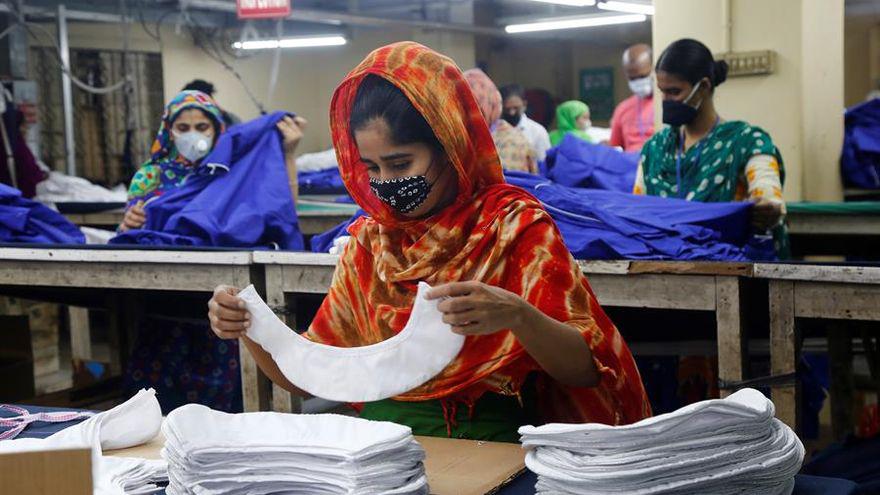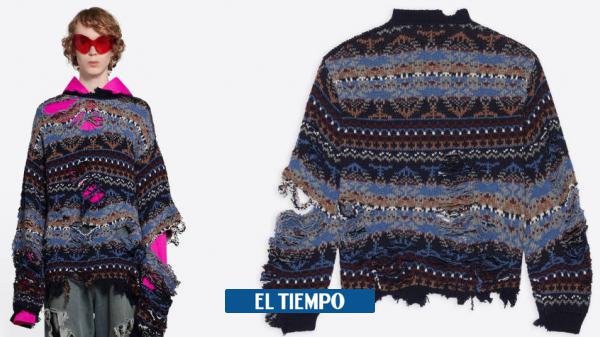Bangladeshi garment factory workers: 'We only wash our hands once when we enter, that's all'
Despite lockdown measures imposed across the country due to the coronavirus, Bangladeshi textile factories have reopened despite workers denouncing their lives are in danger. They complain about overcrowding conditions in which the use of masks is not required and the minimum distance between people is not respected.
The virus gives the fashion industry its own medicine: there are no factories in Spain to bring production back
Know moreGovernment directives indicate that clothing factories, which supply some of the most important brands in the world and which represent 84% of the country's total exports, can resume activity if they respect physical distancing and the prohibition of using the public transport.
However, The Guardian has spoken to factory workers in the Gazipur and Ashulia industrial zones, outside the capital Dhaka, and their account does not fit with the official directive. The only new measure, they say, is hand washing when entering the factory. Physical distancing is not being enforced at their posts and they travel on overcrowded buses to the factory. Many are worried about going back to work, but say they have no choice if they don't want to lose their jobs.
A 19-year-old who works ironing clothes in a factory in Ashulia says that workers had to go on strike to obtain minimum protection measures such as reusable masks or the installation of handwashing stations. "We went back to work last Sunday and the first day there was no change in the factory," he says.
"I saw on the news that they had promised protective equipment like masks and physical distancing measures, but our factory didn't give us anything, we had to pay for the masks out of our own pocket," he continues. "We only wash our hands once when we enter the factory, that's all," he adds, shaking his head in disbelief. "And there's no physical distancing or anything like that, everything is exactly the same as before."
According to Shefaul, a 20-year-old machine operator, the garment factory owners are trying to "cheat" the workers. "We know things are getting worse," he says. "People are getting sick even inside the factories during working hours, but we are being told by management that everything is safe and completely under control, which is a blatant lie." The Guardian has not been able to verify which clothing brands the factory works for.
A sunken sector and workers at risk
The decision to reopen clothing factories has divided the country. Bangladesh has a relatively low number of coronavirus cases, about 10,000, with only 187 deaths, but it is also one of the countries with the fewest tests per capita in the world. The garment industry, on the other hand, is the country's largest source of income. Valued at approximately $34 billion, it employs more than 4 million people in 4,500 factories.

18. A lot. Tbh I need to start learning how to use other programs (blender, asesprite, etc) My art process changes a… https://t.co/dmIaRoQNcH
— M II ST (Hiatus) Thu Jul 22 12:24:28 +0000 2021
The coronavirus has hit the industry hard, with an estimated $3.5bn lost due to canceled or suspended orders in the last two months from brands including Topshop, Asda, Urban Outfitters, Sports Direct, New Look and Peacocks.
The dozens of factories in Bangladesh that supply the department store Debenhams are in a particularly difficult situation. The coronavirus crisis has left the multinational of British origin with a legal administrator and unable to pay millions of pounds in garments that had already been ordered and that are now waiting in factories and ports. According to its suppliers in Dhaka, the chain has asked them for an "unaffordable" discount for some of the goods at the ports.
Like all apparel retailers, we have had to make some very difficult decisions in relation to our supply chain. "We are trying to reach an agreement with all those affected in the fairest and most open way possible. As we have said, the suppliers that continue to work with us while we have a legal administrator will be paid in installments."
The financial burden of cancellations and withheld payments has fallen on factory workers. In March they left more than 150,000 people without pay. When in the middle of that month the factories stopped production, thousands of workers took to the streets to demonstrate because of the hunger they were experiencing.
It was that pressure to revive the garment industry, as well as to prevent orders from going to factories in Vietnam or Cambodia, that led to the official decision to reopen factories at the end of April. Right now there are more than 1,000 in operation.
According to Sarwer Hossain, a workers' rights activist from Dhaka's Savar district, the decision to reopen without adequate security measures is putting the lives of hundreds of thousands of garment workers, as well as their families, at risk. and communities.
"You can see with your own eyes how crowded the place is," says Hossain, pointing to the noisy roads and market around the factories. “Inside it is even more crowded, most of the reopened factories have not implemented adequate physical distancing or other prevention measures. In only a handful of factories that I have visited there are disinfection booths and temperature controls at the door, with protectors face masks, gloves and frequent hand washing".
At 24, Ayesha works as a machine operator. She was afraid to go back to work, but also a feeling that "there was no other option." "When my line manager called me and asked me to go back to work, I asked him, 'Why are you doing this? Do you want us to die?'" she explains. "He told me that if we didn't show the world that the factory was up and running, the orders would go to Vietnam or Cambodia or other places and we'd end up getting kicked out of our jobs anyway."
"I'm not afraid to die," Ayesha adds. "But I'm worried about bringing the virus to my family, I wouldn't be able to forgive myself."
Translated by Francisco de Zarate


























'The ambassador's daughter': everything about the premiere of the Nova series
18/03/2022A girl named Melek arrives in her living room and finds a dead man. Her mother, in the bathroom, cleans the blood from her clothes and her face, in addition, she keeps a knife along with the rest of the things in ...